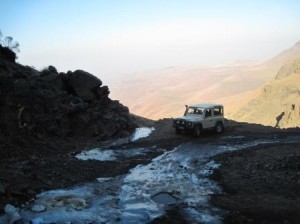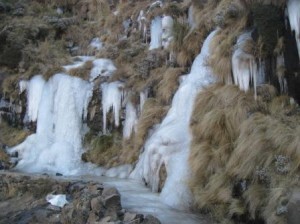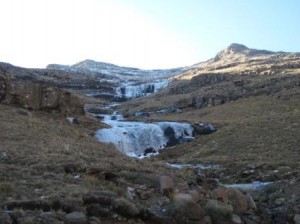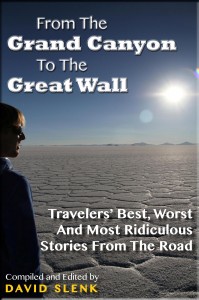Lesotho and the World Cup – A Road Trip
by Barbara on Nov.21, 2010, under Published Travel Articles
Compiled and edited by David Slenk (US)

We drive; a generation, a movement, beating a heart. On the Road, Dean Moriarty, I am on the road, a road trip through Lesotho. … in no time at all we were back on the main highway and that night I saw the entire state of Nebraska unroll before my eyes … an arrow road, sleeping towns, no traffic and the union pacific streamliner falling behind us in the moonlight … unreal with dream like rapidity as we roared ahead and talked … it was time for us to move on…. we are a seeking generation, we want god to show us his face.
It is the World Cup; football has an art like essence, blessed dancers that move their feet around a sphere shaped object, pushing, kicking, passing, on a stage, a world stage, the sound of movement, crowds, sentences constructed as hope, never a pattern, always a goal, seeking a face, finding a god, beginning, ending.
We set off from the Lowveld on a warm day, I shiver as I imagine the cold mountains that are our destination and close the window. The Landover purrs, she enjoys the open road as much as she likes the loneliness of cloistered boulder strewn paths, she flexes her muscles as I feel the change of gears. My a-gendered, engendered car is my core, a technological core, my absence, I do not have her power or her ratios, every point of contact between my body and her metal is a site of a secret burial, a metallic prosthesis. The road is long, for the first six hundred kilometres we pass cars, beating the tar, making time, misty clouds soak up shadows in the coal mine belt. We are quiet, there is no need to talk for we move, movement is sound, it hisses, it blows the scarf from my shoulders, 140 kilometres an hour.
England versus Germany, the sound is on the radio, audio is different to visual, imaginary footwork in speech, the hum of countless voices, colours in a whisper, the echo of expression singing at an infinite distance that blends, by sheer impossibility, into one high vibration, a goal between the posts penetrates ears beyond my hearing.
We pull into a garage outside Ladysmith, the television above the pumps throbs, Mick Jagger in the stands is mournful, the English are defeated; Deutschland Uber Alles. We stop at the Nottingham Road Hotel; hotels are old fashioned, unhealthy steamed pudding with custard, brass keys.
“Do you have a room for the night,” I ask the young man who sits at the reservation counter.
“Sure,” he says, “we can give you any room, we are not full.” Laughter comes from the bar, “well we are full,” he smiles, “but not with guests that will stay the night, that sound”, he points to the bar, “is the locals, they come here to watch the football and to drink. Do you want room 10 or 9,” he continues, “room 9 is haunted. The story is that a good time girl was here for the night, she was longing for her sweetheart to return to her, and of course he never did so she threw herself off the balcony; the other story is that she was pushed by a man who refused to pay her for services rendered; which ever story you want to believe,” he smiled, “I like the murderous one myself. At night she walks the room switching on taps, putting on the lights in the bathroom …. a rolling stone”
“I’ll take that one.”
“Great,” he winks.
From down the bar a woman laughs the song of glasses, music touches full lips. The television is on, it is the football, we follow the road to find the football. There before us, in a kaleidoscope, are ballerinas on the screen, the ball shimmers, the referee runs, lonely for the world is against him. The fire warms us as we raise our glasses; tequila is thrown in the air.
Sani Pass is the first of the mountain passes that we will drive. At the border the South African customs officer laughs, “who is the driver,” he says. My friend points to me, “ah,” he continues, “I hope that you trust her, the roads are narrow and treacherous, you will have to engage low range and stay in second gear, it is eight kilometres, you will take at least two hours.”
 The road is steep, I cannot move out of first gear, the Landrover sighs and loosens her muscles, I feel a bodybuilder’s strength, the range of her power, on the slopes she will glide upwards in second gear, in the more open spaces she jogs and moves into third, on the ninety degree hairpin bends she crawls in first. On the side of the road, as we move higher, there is ice, small streams that have frozen over. I get out and touch the hard water, it does not flow, a frog lies ice covered inside its transparency, I pick up a piece of snow and throw it over the cliff top, it bounces and rolls towards the bottom, down. On this road I am not of human species, I do not have legs to walk, I have wings to fly. I feel the power of the Landrover, her thighs grip hard around my calves, the accelerator sizzles, the clutch lurches, my wings are in perfect condition, I no longer have a need for angels, they are all inside me.
The road is steep, I cannot move out of first gear, the Landrover sighs and loosens her muscles, I feel a bodybuilder’s strength, the range of her power, on the slopes she will glide upwards in second gear, in the more open spaces she jogs and moves into third, on the ninety degree hairpin bends she crawls in first. On the side of the road, as we move higher, there is ice, small streams that have frozen over. I get out and touch the hard water, it does not flow, a frog lies ice covered inside its transparency, I pick up a piece of snow and throw it over the cliff top, it bounces and rolls towards the bottom, down. On this road I am not of human species, I do not have legs to walk, I have wings to fly. I feel the power of the Landrover, her thighs grip hard around my calves, the accelerator sizzles, the clutch lurches, my wings are in perfect condition, I no longer have a need for angels, they are all inside me.
At the top we cross over to Lesotho, 2800 meters above the sea, I watch a goshawk fly to the stars, Sloggerts ice rat runs between rocks and trembles. At the hotel we get a room, it is cold, there is no water as the pipes have all frozen over, “we can get you hot water in the morning,’ the man who checks us in says, “and in the evening to wash with, but it will not come from the taps.” I shiver as I take my jeans off and put on long johns to keep my blood running, silky, I cup the small flame of a lighter in my hands, fire.
“Where is the television,” I ask.
The man at the bar points to a room across the car park, “at night we all gather there to watch the football. I am Basotho, but I still support Bafana Bafana for we have no team in the Cup, I watched them when they were defeated, it was a sad night.”
I rub my hands together; the sweet sherry warms my throat. We go to the television room, inside are men, they are in great coats and balaclavas, for a moment I do not recognize them and then I realize that they are the men from the Lesotho border post, it is not far away. The room is bitter; my rabbit fur hat grasps my head firmly.
“Do you mind if we smoke,” a wrapped up face asks.
“No,” I reply, I imagine that the fire of his small cigarette will make me warm; the smoke will blend with the mist that comes from my breathing nose. We sit for two hours, my fingers are numb, the rain beats down on the colours of the players, they wipe the water from their hair, it mixes with their sweat, they pirouette and run and find the goal posts, the Brazilian coach is fired, the favourites loose, Holland is triumphant. Later, as I hold my feet in my hands before the small fireplace, I know that I have come as high as heaven, and it is cold.
“Follow the road through the valley, over the Senqui River,” a man tells us, “at a cross roads you will turn left, then you will find a town, it is only 80 kilometres but it will take you at least five hours, from there straight to Sehonghong.”
The road is curved; the sun reflects and ripples off the snow edged mountains. We reach Black Leopard Pass, 3300 meters above the sea; I get out and watch a bird swoop downwards towards a mouse in the rocks. The wind bites my skin, I look out at a vista of nothing; nowhere, everything. The road is gravel, twisted, we drive, not as Dean Moriarty did on Route 66, but we drive with the same freedom that he had, the same movement towards something that we do not know, that we can never know, I hear the sound of the words, the engine, the fall of a boulder. We watch a bald ibis; the sun blinks on its iridescent purple tipped wings, the red bald head ducks to eat mountain grass seeds. We find the cross roads and turn, and drive, and drive further, then the road falters. In a village a bus stands still in the square, a man comes close, he rubs his stomach, he is hungry, he pulls a blanket across his shoulders, a chicken fluffs out its feathers as it walks past us. The bus driver has a beer bottle in his hands, he sways, then he squats down and draws a map in the sand, “you have taken the wrong turn,” he says, “go back to the river, turn left and then, maybe one hour, you will find the road to Sehonghong.”
I am tired, the night is closing in, a curtain of black will soon surround the sun. I watch young boys, they cannot be more than ten years old, ride bareback on small mountain ponies’, their feet naked, they guide angora goats with their thick white curls into the grass shelters, sheep hunker down in the rocks and nuzzle each other. We drive on, then there are lights, cars, people. At a small hotel we stop, “can we stay the night,” I ask the man in the entrance?
“No, we are full,” he replies, “there are lots of tourists here now, it’s the World Cup, where are you from, I can take you to our other place, you must follow me, it is not yet completed but it is warm.”
“Where are we,” I ask him?
He looks bemused, “Thaba Tseka,” he laughs, “you are lost, no.”
The next day we again get directions.
“You went wrong,” a man says with a smile, “come with me, I have work to do at the cross roads where you must turn. I think that you go that way, then onto Qachas Nek, it is a short distance but it will take you a long time, so you must start off now. At first we travel at speed, the road becomes stonier, we slow down. At the cross road we wave to the man who has shown us the way and turn. It is 150 kilometres to Qachas Nek, so close, so far. The road is perfidious, exquisite, the hairpin bends squirm and sleekly glide upwards, boulders lie across silky water, we move at five kilometres an hour. The Landrover argues with the gravel, her tendons strain, I move her into a low range, heavy, powerful. We drive over a small river, clamber over the rocks, my friend stands in front of the car and guides me, first left, then right, a wild gesture as the underside of the Landrover drives over a spiked stone. My shoulders hunch stiff, the muscles twist and cramp.
Once again the night draws down, there is no light except for a lone village where a candle burns in a hut, a fire smokes out and breathes the cold air. Then, in the distance there is electricity, a tar road, trucks, the sound of people. Qachas Nek is active, a buzz, trucks belch exhaust fumes, shops wink with their dim lights. In the night we listen to the sounds of the road.
In the morning we drive over the border and into the Eastern Cap, through Rhodes and onto Hogsback for a celebratory rest. The roads are straight, there is no gravel, the birds fly above in wheels and delight in the morning mist.
In Hogsback wooden hogs are sold in the streets, there is freshly baked bread and cheese wrapped in cellophane. There are tame exotic trees from Australia, California and India, I find a brass priest, a deadly weapon used to kill trout that fly fisher men have caught, it lies on a dashboard. In front of a fire heroic Argentineans loose their grasp on god’s hand, the world gasps; Ghana, the hero’s of Africa, are defeated by Uruguay, some say cheated, a desperate attempt, a failure; African hopes die on the field.
We enter Lesotho at the Ficksburg border post, destination the Katse Dam. We stop in the town, “it is a three hour drive on tarred roads,” the forlorn man whose house is filled with cats and from whom we buy fly to fish with, says, “you just follow the road it takes you straight there.”
Once again the road is steep, it winds up and it winds down, it plays with mountain slopes, it shows us peaks and valleys, this is the road built in 1997 by the Lesotho Highland Water Consortium to transport everything needed to build the Katse Dam. The road is icy, the bends are sharp and the wind like a razor. We wind upwards, a taxi passes us, I can smell the burning of its brakes, the driver cannot go more than thirty kilometres an hour even though he knows the road, he drives it daily and sears the rubber of his brakes. We reach the top and look out at a world that is far away, miniature. We follow the fifty kilometre dam, it widens and then it narrows, small rivers run into it than they run out. This is the dam that keeps the taps running in Gauteng, water that I drink in Johannesburg.
We take a tour of the dam, concave and convex walls, only built once before by Roosevelt in 1927, technology. The beauty of the great humming central water pumps that hold the hydraulic pressure of a mountain chain and the electric power of a vast horizon all synthesized in marble panels that bristle with dials, keyboards and shining communicators, a model for writing poetry. This artwork took five years to create, teams of engineers from Italy, France, Germany and South Africa came together to build the mighty walls, the dam that flooded villages and people, swept away goats and chicken, water. Defined lines reach high, we enter the wall and walk between its thickness, damp, water oozes from the walls, we stand on ramparts and look out at cormorants and a trout, we stand and marvel at the natural gifts and wonder at the strength of man.
The Katse Botanical Gardens is brown in the cold; in summer, when the rains have come, it is a rainbow. Bokang Ntloko, the botanist who runs the garden tells us that the Highlands Water Project, while it displaced villages and flooded indigenous plants, set up the garden and relocated the villagers.
“Are they better off now,” I ask him, “or has this dam taken something from them?”
“It’s a bit of both,” he replies, “all the plants that they grew, they are all here, we try to get people interested in them, particularly the medicinal plants, but sometimes I wonder if they were interested in them at all, or if it was all just a story, but I also know that souls lie under that water. That is progress, technology gives and takes?”
A dam that blazes, a violent electric moon, smoke-plumed hydroelectric serpents, walls hung on clouds by crooked lines of smoke, gymnastic bridges, wheels like hooves of steel horses; or a monstrous age of mechanized industry lurking perilously in the night, the new, superior aesthetic of the machine. Technology, it gives and it takes.
“Look here,” Bokgang says, “look at these spiral aloes; this is the Lesotho national flower.”
I look at the leaves that grow in a spiral pattern; they wind snake like around the thick stem, flowers, red and yellow tongues.
“There are few of these aloes left,” he continues, “people come and take them away, they bring a truck and ask the people if they can buy them, and so they have been taken, but look I am growing some from seed, come, take one you can grow it back at your home.” I take the small aloe from his hand. “It will take a long time to grow,” he says, “nurture it, remember.”
Later than day we drive to a river that leads into the dam and fly fish. I watch the rod swoop upwards and then down, the line arches its back, an arm moves with it, I look at feathers on top of the water, they swim. A fish bites, it is on the end of the hook, I reel it in, it fights and tangos, a rose between its teeth, a football game, then it is subdued, a broken defeated player.
For two nights we sit before a coal fire and watch the football semi finals; Germany versus Spain, castanets play; Holland versus Uruguay, orange shirts glow with conflagration, the crackle of a universe, angels dancing in the static? On the Road, we’d dig the whole world with a car like this because, man, the road must eventually lead to the whole world.
